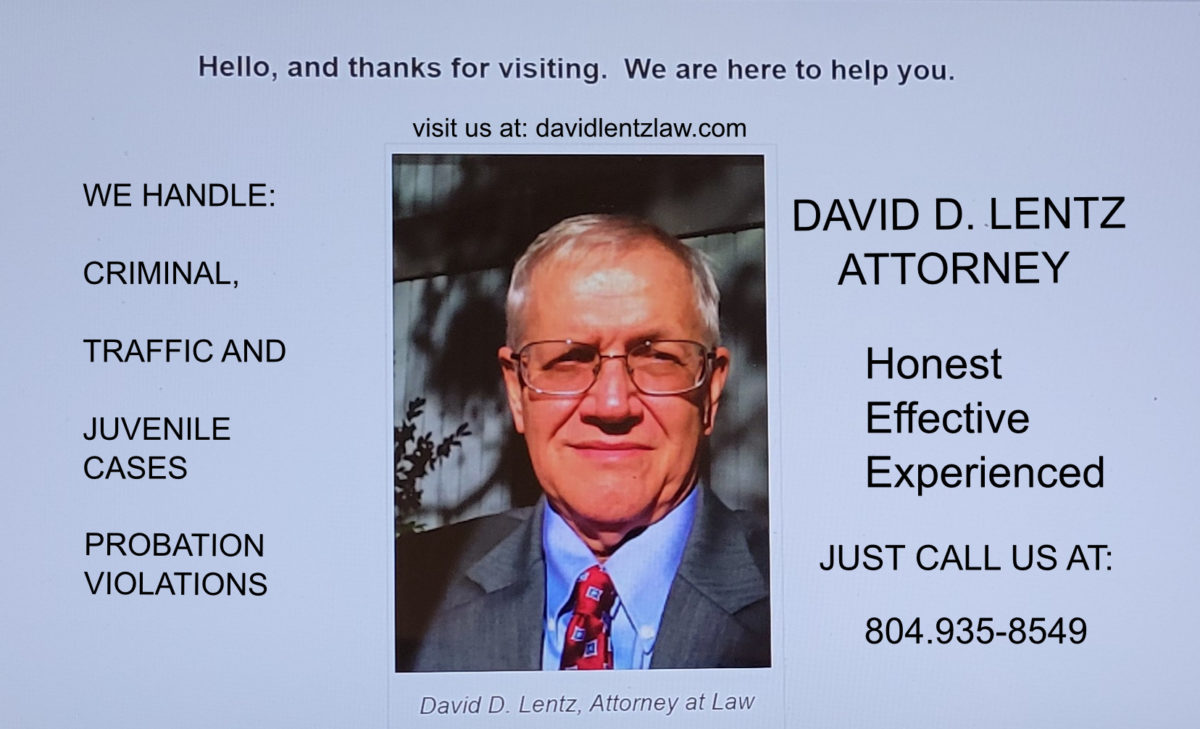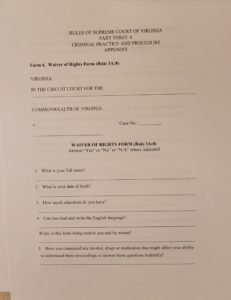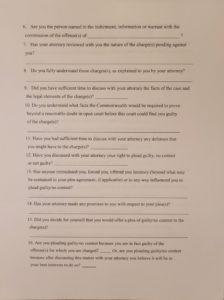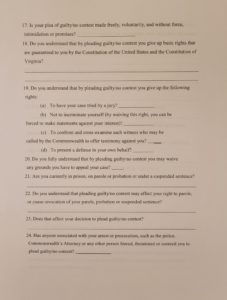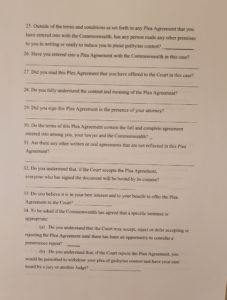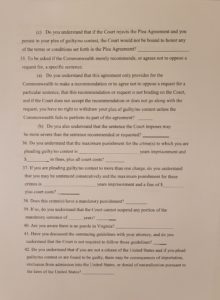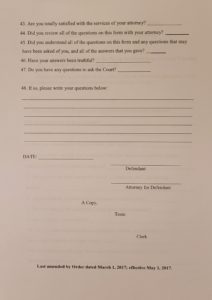Sentencing & Pleas Criminal & Traffic
HONEST, EFFECTIVE & AFFORDABLE
Legal Representation
THIS PAGE IS NOT DESIGNED TO SCARE ANYONE. WE ARE ON YOUR SIDE. WE ALWAYS LOOK TO OBTAIN A FULL ACQUITTAL or FINDING OF NOT GUILTY FOR OUR CLIENTS. However, sometimes that is not possible because the prosecution’s evidence is too strong and we can find no way to exclude important incriminating evidence. When that happens it is often advisable to engage in plea bargaining with the prosecution, sometime offering a guilty plea or a plea of no contest, in exchange for a reduced jail sentence, a smaller fine and/or a conviction of a lesser offense, When that happens the contents of this page are extremely important and must be read and understood.
THIS PAGE CONTAINS VERY IMPORTANT INFORMATION THAT LAWYERS ARE ENCOURAGED OR REQUIRED TO DISCLOSE TO THEIR CLIENTS BY THE COURTS.
As such….
IF YOU HAVE BEEN CHARGED WITH A CRIME OR GIVEN A TRAFFIC SUMMONS BE SURE TO READ ALL OF THIS PAGE because it deals with with plea bargaining with prosecutors, the consequences of guilty pleas (if you decide to enter one) and sentencing.
IF YOU HAVE QUESTIONS, WE ARE HERE TO HELP
JUST CALL US 804.549.7240
YOUR RIGHT TO A JURY.
In any case, where you face the possibility of going to jail or the penitentiary you have the right to have a jury. Or you can be tried by the judge sitting without a jury. Examples of cases where you have a right to a jury include all Class 1 and 2 Misdemeanors and all Felony cases being tried in the Circuit Courts of the Commonwealth of Virginia. [If you have a federal case please ask us about your right to a jury trial.] [ Please note however, that jury trials are time consuming and very labor intensive. As such, the legal fees charged in cases involving juries are normally higher than those tried before a judge sitting without a jury and are calculated based on the particular facts and circumstances of the case.]
GUILTY PLEAS and PLEA AGREEMENTS
We always seek acquittal and to have all charges dismissed against our clients. However, sometimes that is not possible under the facts of the case because the prosecution’s evidence is too strong.
In such cases, in an attempt to get a more lenient sentence we often engage in plea negotiations with the Commonwealth. This sometimes means that the Commonwealth will require that the Defendant enter a guilty plea to some other or lesser charge in exchange for some type of lesser sentence.
The Consequences of Guilty and Other Pleas:
Anyone pleading guilty, not guilty or nolo contendere or entering another plea in Virginia Circuit Court (or in some cases in Juvenile and Domestic Relations District Court) will be asked the questions on the pages below by the judge and/or you will be required to fill out this form. However, we ALSO require clients with cases in General District Court (state court) to read the pages below as well because much of it has application in Virginia’s General District Courts as well. [Also, below the following pages at the very bottom of this page are Virginia statutes setting form the prison/jail terms and fines generally applicable in criminal and traffic case felonies and misdemeanors. All clients must read these statutes as well.]
To ENLARGE PRINT for EASIER READING click Ctrl hold then the plus sign [ Ctrl and +] Doing so once enlarges. Doing so two or three times brings page to full size.
SENTENCING IN CRIMINAL AND TRAFFIC CASES
BELOW are the general rules for SENTENCING. In other words, these are the PUNISHMENTS defendants face in criminal and traffic cases if they are found guilty by the court or jury or plead guilty. The sentences hold true in most cases, HOWEVER, the punishment/sentence in your case may be different if the particular offense you are convicted of has for example, a particularized sentencing provision and/or has a provision requiring a mandatory minimum jail sentence. Other examples of additional penalties include in for example DUI cases where ignition interlock may be required on your vehicle and/or that you attend an ASAP program. Also, some statutes permit the government in some case to confiscate your property. Ask your lawyer. But below, are the sentencing laws if the statute you violated says nothing else about sentencing.
If you are charged with 2 or more crimes or traffic offenses and are convicted of (or plead guilty to) more than one offense, then all sentences/punishments are “consecutive” (meaning ADDED together). For example if you are convicted of 3 different Class 1 misdemeanor offenses, you could receive a jail sentence of 1 plus 1 plus 1 = 3 years of jail time and a fine of $2500 x 3 =$7500. Your lawyer would try to get less than that and ask that the Court suspend most/all of that time and/or fine, but this just illustrates what, could happen.
-
18.2-11. Punishment for conviction of misdemeanor.
The authorized punishments for conviction of a misdemeanor are:
(a) For Class 1 misdemeanors, confinement in jail for not more than twelve months and a fine of not more than $2,500, either or both.
(b) For Class 2 misdemeanors, confinement in jail for not more than six months and a fine of not more than $1,000, either or both.
(c) For Class 3 misdemeanors, a fine of not more than $500.
(d) For Class 4 misdemeanors, a fine of not more than $250.
For a misdemeanor offense prohibiting proximity to children as described in subsection A of § 18.2-370.2, the sentencing court is authorized to impose the punishment set forth in subsection B of that section in addition to any other penalty provided by law.
-
18.2-10. Punishment for conviction of felony; penalty.
The authorized punishments for conviction of a felony are:
(a) For Class 1 felonies, imprisonment for life and, subject to subdivision (g), a fine of not more than $100,000. Any person who was 18 years of age or older at the time of the offense and who is sentenced to imprisonment for life upon conviction of a Class 1 felony shall not be eligible for (i) parole, (ii) any good conduct allowance or any earned sentence credits under Chapter 6 (§ 53.1-186 et seq.) of Title 53.1, or (iii) conditional release pursuant to § 53.1-40.01 or 53.1-40.02.
(b) For Class 2 felonies, imprisonment for life or for any term not less than 20 years and, subject to subdivision (g), a fine of not more than $100,000.
(c) For Class 3 felonies, a term of imprisonment of not less than five years nor more than 20 years and, subject to subdivision (g), a fine of not more than $100,000.
(d) For Class 4 felonies, a term of imprisonment of not less than two years nor more than 10 years and, subject to subdivision (g), a fine of not more than $100,000.
(e) For Class 5 felonies, a term of imprisonment of not less than one year nor more than 10 years, or in the discretion of the jury or the court trying the case without a jury, confinement in jail for not more than 12 months and a fine of not more than $2,500, either or both.
(f) For Class 6 felonies, a term of imprisonment of not less than one year nor more than five years, or in the discretion of the jury or the court trying the case without a jury, confinement in jail for not more than 12 months and a fine of not more than $2,500, either or both.
(g) Except as specifically authorized in subdivision (e) or (f), the court shall impose either a sentence of imprisonment together with a fine, or imprisonment only. However, if the defendant is not a natural person, the court shall impose only a fine.
For any felony offense committed (i) on or after January 1, 1995, the court may, and (ii) on or after July 1, 2000, shall, except in cases in which the court orders a suspended term of confinement of at least six months, impose an additional term of incarceration of not less than six months nor more than three years, which shall be suspended conditioned upon successful completion of a period of post-release supervision pursuant to § 19.2-295.2 and compliance with such other terms as the sentencing court may require. However, such additional term may only be imposed when the sentence includes an active term of incarceration in a correctional facility.
For a felony offense prohibiting proximity to children as described in subsection A of § 18.2-370.2, the sentencing court is authorized to impose the punishment set forth in that section in addition to any other penalty provided by law.
